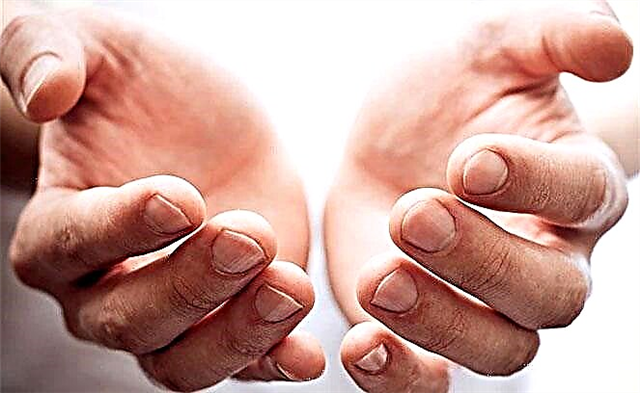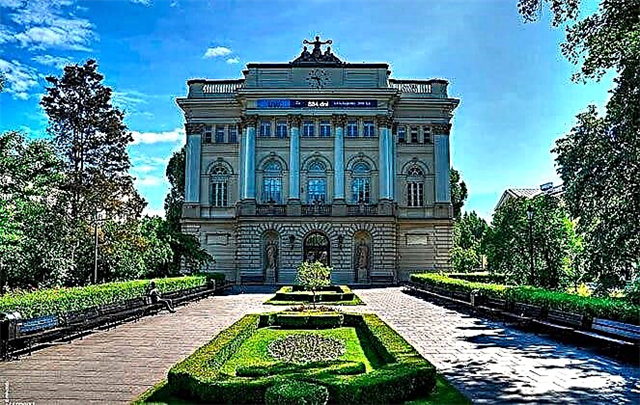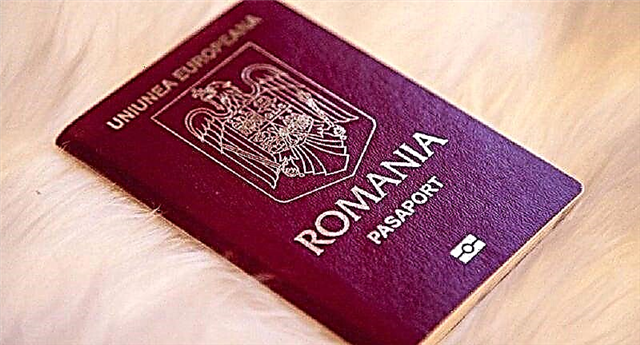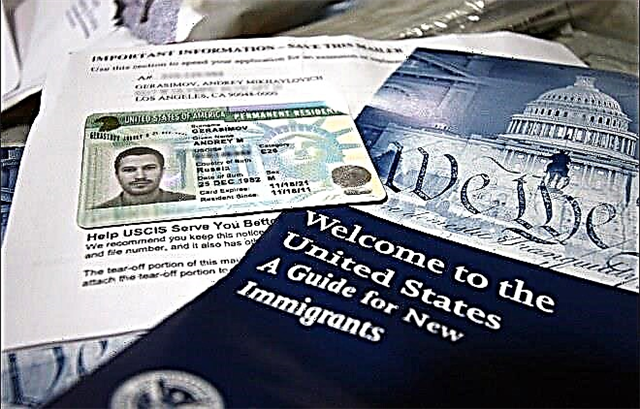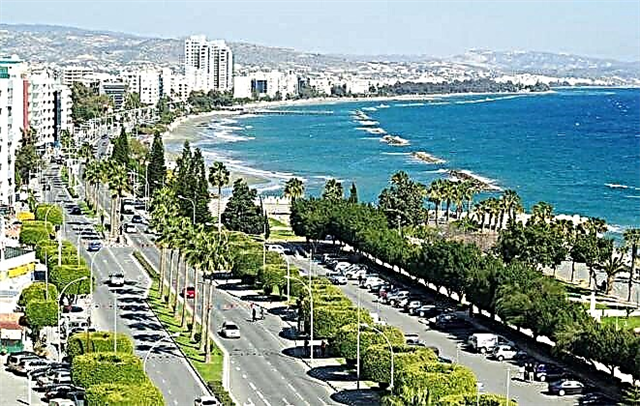In search of a comfortable place to live, many pay attention to Cyprus. The Russian diaspora now numbers almost 50 thousand people and calls the island its second home. It attracts those who are tired of the bustle of the city, harsh winters and dull landscapes. But do not forget that on the geopolitical map of the world, the sunny island does not have state integrity, being under the protectorate of two countries at once - Greece and Turkey. What is life in Cyprus and why is the island not losing its popularity among expats?

Political situation today
The Republic of Cyprus gained independence from Great Britain, which colonized the island in the 19th century, in 1960. The constitution, adopted by the new government, proclaimed the cohabitation of two nationalities in this territory: 80% of Greeks and 18% of Turks. The inequality of quotas became the reason for the dissatisfaction of the Turkish part of the population, which already at the initial stage of the life of the new state refused to comply with the decisions of the Greek government.
In 1974, a coup d'état took place on the island, which resulted in the landing of Turkish troops, which occupied 35% of the territory. In 1983, the Turkish part of the population proclaimed itself TRNC - Turkish Republic of Northern Cyprus. Until now, this state remains recognized only by Turkey. In the UN, this territory has the status of "occupied by Turkey".
The political situation in Cyprus today does not in any way affect the peaceful life of its citizens. Negotiations on the unification of its northern and southern parts have been going on for many years, but so far the parties have not reached an agreement on the percentage of the territories that should be occupied by both republics.
The accession of Cyprus to the European Union in 2004 had a background: the country was counting on the help of the European community in resolving the "Cyprus issue". But the EU has not shown due involvement to this day, remaining indifferent to local differences.
Today, the economic situation in Cyprus is due to the presence of Russian investors, to whom the local authorities are willing to issue passports in exchange for money invested in the Cypriot economy. But the situation began to change somewhat in 2021, when American vessels entered the Mediterranean waters, the purpose of which was to search for gas on the island's shelf.
This suggests that a third participant has entered the game, who does not hide his intentions to reduce the economic influence of the Russian Federation in Cyprus. The first steps in this direction have already been taken: the island's authorities supported the sanctions list adopted by the United States, and froze the assets of the Russians who were included in it, and the banks of Cyprus tightened control over settlement operations. 2021 will show how justified this way of uniting the island will be.
Living conditions on the island
The inhabitants of Cyprus are called Cypriots. They lead a measured lifestyle, honor family traditions, love holidays and are in no hurry. In 2021, the southern part of the island experienced an economic crisis as a result of close ties with Greece. And although the situation has stabilized today, the island can face a lot of problems. The main consequence of the crisis was a significant decrease in the income of citizens.
The first thing that migrants are interested in is the standard of living in Cyprus. Today, living in its southern part may seem more expensive than in some Schengen countries, but in Turkish territory you will find about the same prices as in Moscow.
Wage level
It is not easy for a foreigner or non-resident to find a job on the island today because of the high unemployment rate. Local companies will first have to prove that there are no suitable candidates among the citizens of the country and residents of the EU, and therefore they already have to take foreigners.
It can take at least four months from submitting a request to the Ministry of Labor to obtain a work permit for a citizen of another country to the issuance of a document.
Before going on a work visa, it is important to know how much the minimum and average salary in Cyprus (South) is:
- minimum income - 870 euros;
- average earnings 1,200-2,000 euros;
- An income of 2.5-4 thousand euros is considered high.
It is very difficult to obtain refugee status here - the state is not ready to pay benefits. But by investing in the economy an amount of 2 million euros or more, you can get a resident status.
The main areas of activity for those who want to succeed on a professional basis are banking and finance. There are a lot of freelancers and service workers in the country. During the season, waiters can receive about 1000 euros, cooks - up to 1.5 thousand euros.
The peculiarities of life in North Cyprus are such that you can only get the right to work on the basis of a work visa. Residence permit does not provide such an opportunity.

Popular areas are real estate trade, construction, tourism, medicine. There is a great demand for those who speak English and Turkish. The minimum wage here is 1,757 Turkish lira or 290 euros.
Social protection of the population
The lower pension threshold in the southern part of the island is 800 euros. Even foreigners who have already reached retirement age, have lived on the island for at least four years, and all this time have made regular contributions to the pension fund, can apply for it. If you plan to move to Cyprus for retirees, you should remember that first you will have to obtain a residence permit of category F (issued to persons who live on income received at home).
This emigration program does not allow doing business, and therefore will have to live on additional income. Any candidate, regardless of citizenship, can receive a pension in South Cyprus.
The state provides the allowance for families with children (including foreigners legally residing in the country). Families with children are entitled to payments:
- under 18 years of age (single and unmarried);
- full-time students 18-23 years old;
- persons 18-25 years old who also study at universities in full-time departments after serving in the Cypriot army;
- disabled children regardless of age.
Those who have lost their jobs can count on unemployment benefits. Its amount depends on the length of service, the period of residence in the state, the amount of contributions to the social insurance fund. The first 6 months after dismissal or redundancy, the unemployed receives 80% of the salary.
Medicine level
To use the free medicine on the island, you need to purchase insurance. Its cost will depend on the number of services it covers. The takeoff run can be from 100 to 3000 euros.
A doctor's appointment at a public clinic will cost 10-15 euros, in a private one - 30-60. Calling an ambulance costs about 200 euros, and therefore no one calls it here. The Cypriots themselves, if there are no serious illnesses, prefer to buy a cheap policy and pay for each visit to the doctor.
According to the European Commission, life expectancy in Cyprus is 81.8 years. The main health problems of the local population are related to smoking, diabetes and obesity.
In North Cyprus, clinics are also divided into public and private. Only the indigenous population can use the services of the former. Tourists and foreigners will have to buy an insurance policy. The key areas of medicine in this part of the island are dentistry, laser and cosmetic surgery.
Education system
Long-term residence in Cyprus with children will certainly make you think about such an issue as education. Education at the school is free for representatives of any peoples and regardless of whether the child is a citizen of the state, lives in it on the basis of permanent residence or residence permit.But it should be remembered that the language of instruction in public schools is Greek (South Cyprus) and Turkish (North Cyprus).
There are several private schools in Paphos. There, training is conducted in English and in some even in Russian. But they are all paid. The cost can range from 3 (in elementary school) to 7 thousand euros (in the last grades) for one academic year.
Free education in a Russian school can be obtained only in Nicosia - in an educational institution functioning at the Russian consulate.
But kindergarten will cost a family about 45 euros per month for half a day and 150 euros for a full day. Another 2.5 euros per day will have to be paid for food. For an additional 2.5 euros per day, your child will be fed in the garden.
Higher education is also paid. There are 12 international universities on the Turkish part of the island, where students from 80 countries of the world receive education.
Crime level
Before the crisis, which significantly affected the well-being of the local population, security in Cyprus was beyond doubt, and you could live here in peace, without worrying about personal property. Here they never closed the doors of houses at night and did not put the car on the alarm.
In the last decade, the situation has changed somewhat. With the opening of borders and accession to the EU, the island has become an attractive target for lovers of easy money and simple earnings.
Today, it is increasingly common to read in local newspapers about theft and even contract killings. Yet crime in Cyprus is not as high as in other European countries. And most often it is not the Cypriots themselves who steal, but tourists or migrants who come here in search of work. Unable to find a decent income, some, in order to somehow hold out on the island, do not hesitate to take someone else's.

Most often, information about thefts can be heard from resort towns and places with a large concentration of tourists. And theft in Limassol (the city where most Russians live) has become almost daily news in police reports. And although the crime situation on the island is incomparable with what is happening, say, in Russia, it has recently become extremely necessary to take security measures.
Weather conditions and climate
The first thing that surprises visitors is the lush greenery in winter. Since there is practically no rain in summer, and in the winter months the temperature is kept at around + 10 / + 15 degrees Celsius, the plants need to have time to bloom and bear fruit in the period from late October to mid-April.
The beach season here begins at the end of May, but the sea water warms up only towards the end of May. Therefore, holidaymakers begin to come to the island by the end of spring. Locals do not appear on the beach until mid-June.
The hottest time is July-August. There is practically no wind during this period, and therefore moisture is very much felt. Cypriots prefer to spend the hot months on the Greek islands.
In September, nature pleases with a sea breeze, the heat subsides, and with it the level of humidity. The beginning of autumn is the most comfortable time for rest, however, at the end of September, daylight hours begin to decrease quite noticeably every day.
But winter can be called a real test. The fact is that Cypriot housing is not equipped with a heating system. Therefore, everyone is saved by their own methods: air conditioners, fireplaces, blankets and heated sheets, electric heaters. In the Limassol area, night temperatures can drop to +5 degrees Celsius, and daytime temperatures can rise to +15.
In other regions, daily readings are sometimes held at around +18, but do not forget about strong winds. In winter and spring, the climate in Cyprus is mostly rainy.
How much will life on the island cost
The cost of living in Cyprus includes two main items - housing and food. You can search for real estate on your own (word of mouth works well here), or through an agency that will take a commission in the amount of the monthly cost of an apartment or house.
Housing costs
Mandatory payments include:
- rent - depends on the city and the type of property. For example, an apartment with one or two bedrooms in Paphos will cost 200-400 euros for 1 month, and in Limassol - 600 euros. House in suburban areas with three bedrooms - 1000 euros;
- electricity - in winter about 100 euros per month, in summer - about 70 euros, excluding air conditioning. If with it, then electricity will cost about 1500 euros for 1 year;
- water supply - the bill comes every three months, and its amount depends on the region. On average, water costs 30-50 euros per month;
- utility tax - includes garbage collection, cleaning of public areas. Can reach 100 euros in 1 year;
- gas - usually purchased in cylinders. One cylinder costs 11-15 euros, it is enough for 2-3 months. Another one must be bought in winter to heat the room;
- telephone and internet - 50 euros per month.
The living wage in Cyprus is 2,500-3,000 euros for a family of three (including kindergarten fees, transport costs, buying clothes) with the most modest spending.
Nutrition
Cyprus is rich in fruits and vegetables; it is customary to buy them in small markets where farmers bring their products. In big cities you can find several supermarkets, many fish shops and small specialty shops. In most outlets on certain days of the week, discounts are available for different groups of goods. For example, on Mondays you can buy fruit at a bargain price, on Wednesdays - fish, on Fridays - sausages and cheeses.
The average budget for the purchase of food is 70-100 euros per person per week. A family of three will have to set aside about 500-600 euros a month.
Prices in Cyprus for promotional goods can always be found in special brochures that supermarkets release a week in advance.
Transport issue
During the tourist season, the network of transport routes operates without interruption and you can get anywhere on the island. With the onset of autumn, transport becomes noticeably less, and therefore it is extremely difficult to do without a car. This is especially true for those who live in the suburbs and go to work in the city.

You can buy a used car here for 800 euros. One liter of gasoline costs 1.24 euros (about 300 euros will be needed per month for fuel). Another 500 euros a year needs to be set aside for transport tax and insurance. The exact amount will depend on the vehicle class.
To obtain a license in Cyprus, you need to have a residence permit and live on the island for at least six months. Only tourists who intend to spend no more than three months in Cyprus can drive with an international driver's license.
Features of mentality and tradition
The attitude of local residents towards representatives of the Russian diaspora can be called friendly, especially since it is “Russian” money that forms the basis of the Cypriot economy. In general, Cypriots show hospitality to all who behave with dignity and respect the local way of life and the laws.
Sports are very popular in Cyprus. Gyms are full from morning to night, and you can always see runners along the coastline.
But there are no theaters here, and noisy events and festivals are held mainly during the tourist season. The biggest event for Cypriots during the week is the big family lunch on the weekends.
In general, the family for Cypriots is the most important thing in life. Many live with their parents for a long time, and even if they move out, they still often visit each other. The locals also love to talk and do not miss the opportunity to do it anywhere: in a cafe, in line at the checkout, on the beach.
Russian diaspora
The number of the Russian population on the island exceeds 40 thousand people and accounts for about 5% of the total population. Russians in Cyprus concentrated in four cities: Paphos, Nicosia, Larnaca, Limassol.At the same time, most of the Russian-speaking population prefers to settle in the vicinity, rather than in the urban central areas.
Today, all conditions have been created on the island for the Russian diaspora to feel comfortable. Russian schools and kindergartens function here, you can find shops with products imported from the Russian Federation. And Russian radio stations have long become commonplace for those who have settled in this part of the world.
As for the northern territory of the island, according to the Migration Service of the Republic, about 3.5 thousand Russians live here permanently, and about 9 thousand are on the basis of short-term visas.
Which place to choose
In the process of planning a move, the question of where is the best place to live in Cyprus necessarily arises. There is no single answer, everyone must choose a place for themselves, based on the goals of the move. A short overview of the cities will help with this:
- Larnaca is suitable for a quiet life and relaxation. Finding a job out of season will be very difficult here. Adaptation takes place quickly thanks to the presence of the Russian diaspora.
- Paphos - this city was chosen by the British, who prefer to settle for permanent residence. Ideal for those who dream of living in a historical region - almost the entire city and its surroundings are under the protection of UNESCO. The work situation is the same as in Larnaca.
- Limassol has long been a "Russian" city. It has a well-developed infrastructure, good job opportunities and business start-ups.
- Nicosia is located far from the sea, but there are Russian educational institutions and shops in the city.
- Ayia Napa is very popular with young people and is one of the leading resorts on the island. For lovers of a quiet life, it is not very suitable, since the activity here does not subside even at night.
Outcomes
Before making your final decision, explore the pros and cons of living in Cyprus.
| Advantages | disadvantages |
|---|---|
| mild climate without sudden temperature changes; | weak economy (when compared with other European countries); |
| those who have always dreamed of a house by the sea can easily make their dream come true, the sea is located here on all sides; | difficulties in finding a job; |
| territorial proximity to Europe, relatively close to Russia; | lack of central heating; |
| the opportunity to obtain citizenship in exchange for the purchase of real estate; | shortage of clean water, especially during the tourist season; |
| clean ecology; | low level of wages; |
| friendly population; | due to territorial fragmentation, you can get to South Cyprus through Greece or by direct flight to Larnaca, to North Cyprus - from the territory of Turkey; |
| many people who speak Russian, a vast Russian diaspora; | expensive insurance; |
| Cyprus recognizes dual citizenship; | expensive housing; |
| inexpensive food (in particular seasonal vegetables and fruits); | underdeveloped public transport system. |
| delicious national cuisine. |


